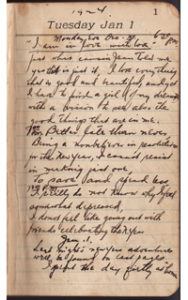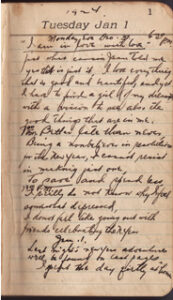Jan. 1
Last night’s New Years adventures
will be found on last pages.
I spent the day quietly at home
[from a memoranda page at the end of the diary]

Jan 1, 1924
New Years Eve. in N.Y. is certainly
an event, last night I deserted my
friends for a while at 11:30 I was
in the jam of the merry and noise
making crowds, Poor, rich, soldiers
sailors, old and young, some masqu-
eraded with countless noisemaking
devices, looking into their faces, every-
body seems to be happy, Slowly I fought
my way to the Capitol Thea. to make
the special midnight performance,
after leaving the theatre at 1:45 the
Street was still crowded with the gay
throngs.
Am I the only one whom this
carnival fails to make happy? But I
think I did notice sadness in some
eyes, are their souls hungry? Longing?
My New Years Eve, was at an end at an
East Side joint where prohibition drinks
were freely served, I reached home 4am.
————–
Matt’s Notes
This entry really starts to give us a feeling for the New York City my grandfather lived in. His description of the crowds is almost cinematic, a whirl of costumed extras (soldiers and sailors? Really?) with smiling faces blowing into noisemakers and clogging the streets. It’s not hard to picture at all.
His offhand mention of the Capitol Theatre, though, really places him a different, long-ago New York. The Capitol, which once stood at the corner of 50th Street and Broadway in New York City, was one of the grand movie palaces that used to be common in America. They disappeared way before my time, but as I understand it they were enormous, spectacular spaces, gilded to the nines and outfitted to invoke the European palaces that their largely immigrant audiences would never have gotten near back home.

In palaces like the Capitol, movies screenings were almost beside the point. Nightly programming included orchestral music (remember that films were silent in 1924, so theaters were outfitted for live orchestras as a matter of course) as well as ballet and opera performances from the theaters’ resident companies.
According to the New York Times archive, the New Years performance my grandfather saw was an exemplary mashup, including “Chaminade’s ‘Air de Ballet’ by the Capitol singers and dancers”, the “Volga Boat Song” (a Russian folk song — you know the tune) and the “Skaters Waltz”. The draw for my grandfather, though, would have been the Capitol Grand Orchestra’s scheduled performance of the “1812 Overture” (no doubt with the cannons going off at midnight) since he was a huge fan of Tchaikovsky. (Oddly enough, as I write this on New Year’s Day in 2007 the “1812 Overture” started playing on the radio station I’m listening to on the Web. Maybe it’s a New Year’s tradition that I wasn’t aware of.)
His reference to the bar he winds up in is the oddest detail for me. I always gathered that he had something like a Buddhist’s monks beatific vibe and moral virtue, and preferred to spend his free time raising funds for Zionist organizations and going to synagogues. It’s hard to imagine that he ever took a sip of alcohol other than at his own bris, let alone wander into a “joint” to drink illegally, but I suppose it was the order of the day on New Year’s eve.
I also find it interesting that he refers to illegal alcohol as “prohibition liquor”, which I always thought was a label created for historical reference. It’s a very official-sounding term; maybe he uses it rather than something more slangy because he’s not exposed to drinking all that much.
Though Papa gives the New Year’s spectacle its due, he’s clearly unable to shake the low mood he mentions in his previous entry. The way he wanders away from his friends to search strangers’ faces for some sign of kinship, some confirmation that other people feel as lonely and dissatisfied as he does, is terribly wistful yet oddly comforting to me. Of course there are others in the crowd who feel at odds with the spectacle, who reflect on their own concerns while pretending to celebrate — if I’d been there there, I might have been of of them, someone in whose eyes he noticed sadness. Haven’t I been known to back away from a crowd, watch a party from the sidelines, withdraw into my own head when I feel at odds with the people around me?
Maybe I share Papa’s very brand of self-reflectiveness, passed to me through his genes or through his influence on my mother. And if that’s the case, it’s not so bad. Papa was admired and beloved, an exemplar for his family of a life well lived, a source of vivid, affectionate memories for a grandson and a granddaughter who barely knew him. It occurs to me that whatever I have in common with him is worth embracing if it means I can be more like him.
————
Additional references for this post:
– Gabler, Neal. “For 25 Cents, Every Moviegoer Was Royalty“, The New York Times, 10/24/89 (subscription required).
——-
Update
I’ve been thinking a little more about “The Volga Boat Song” I mentioned above (give it a listen if you haven’t already). I’ve always thought of this tune as the default accompaniment to images of drudgery or dread in early 20th-Century movies — I feel like I’ve heard it in Bugs Bunny episodes, Max Fleischer cartoons and maybe even Universal horror movies — but I guess I figured it was just always there and never considered its origins. It must have been a real touchstone for immigrants if the Capitol Theater played it on New Year’s Eve for an audience that was no doubt packed with Eastern European Jews like my grandfather. And since Jewish immigrants were no strangers to radio and film work, it’s no wonder that imports like “The Volga Boat Song” found their way into the popular culture of the day.
————–
Update 3/19 –
Listen here to the Volga Boat Song:
Image Credit: Library of Congress LC-USZ62-113144. Inquiring into ownership.
 [Note: This entry appears on the Jan 1 page of the diary,
[Note: This entry appears on the Jan 1 page of the diary,